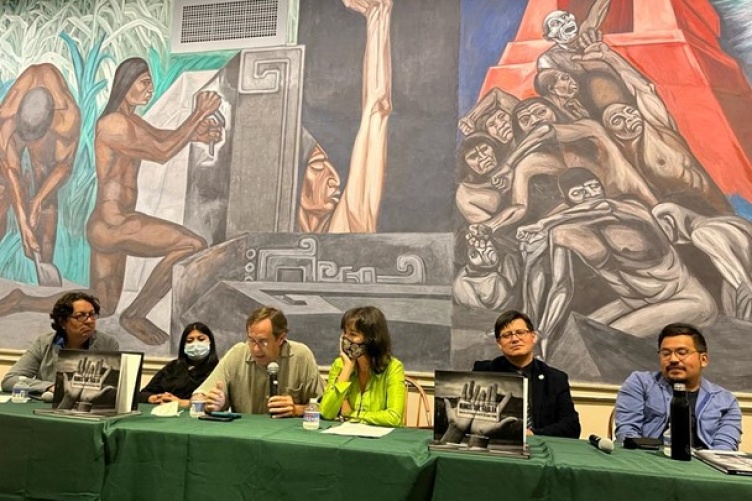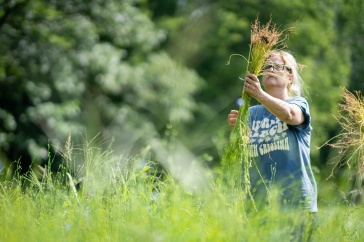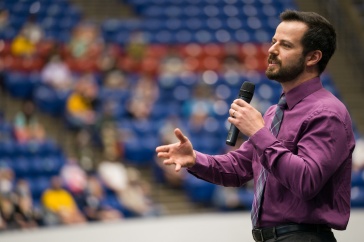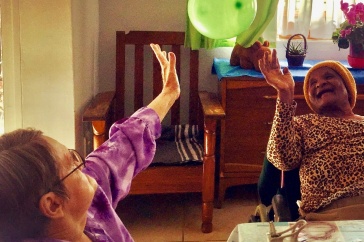
event photo from Hands That Speak event (The Central America Project), photo courtesy of Jorge E. Cuéllar
The UNH Center for the Humanities announces the recipients of its 2022 public humanities seed funding. Over $90,000 in small grants will be awarded to scholars who participated in the Summer Institute in Public Humanities last summer and are undertaking or expanding publicly partnered humanities work. The following faculty and graduate students will be developing or continuing projects with Center funding, generously provided by a grant from the Andrew W. Mellon Foundation, which also funds the Institute:
Rachel (Afua) Ansong, Mt Holyoke College, for “Adinkra symbols from the Akan people of Ghana,” which will investigate, through literary workshops and the creation of a digital exhibit, how Adinkra symbols moved from Ghana to the United States and how these creative-pictorial-philosophical symbols evolved in use as artistic mediums of expression.
Erin Royston Battat, Wellesley College, for “Expanding Natick History,” which will develop a more nuanced public understanding of Natick’s origins by centering the historical experience and contemporary lives of indigenous peoples. The project will be undertaken with the Natick Historical Society (NHS), the Bacon Free Library, and Nipmuc community members and will create programming for the Natick Farmers Market.
Sara Brenneis, Amherst College, for “The Stolperstein Database in Spain,” which will partner Brenneis with local activists in Madrid, Spain, to develop a comprehensive database and map of memorials that commemorate Spaniards who were deported to Nazi concentration camps during the Second World War.
Kristin Bright, Middlebury College (with undergraduates Amun Chaudhary, Middlebury College, and Christian Beck, Dartmouth), for “Supporting the Whole Student: A Public Humanities Initiative for Culturally Responsive Healthcare.” The project is a public partnership with Mount Abraham Union School District (MAUSD), a rural mountainous community of 1300 students in central Vermont, and Mountain Health Center, a federally qualified health center, which will develop culturally responsive workshops for whole student health education and trial those at a community collaborative symposium.
Marie Collins, UNH, for “Hope is a Discipline,” which will invite a cohort of 15-20 teachers to the Museum of Art at UNH to engage in the creation of Journey Boxes, towards the goal of co-constructing public teacher education and professional study humanities’ curricula, informed by teachers’ experiences and framed by an abolitionist concept of hope.
Enrique García, Middlebury College, for “Digital Museum for Puerto Rican comic book artists in Latinxspaces.com,” which will take scholarship about Latinx and Latin American comic books and generate a digital museum to house profile pages, art, links to events and interviews.
Octavio R. González, Wellesley College, for “Podcast Conversations with First Book Authors,” which aims to disseminate the work of first-book academic authors to public audiences beyond the academy.
Kathya Landeros, Wellesley College, for “Representation of Latinx Youth Through Photographic Portraits,” a photographic portrait project of Latinx youth in the Spartanburg, South Carolina area, in partnership with PASOs Spartanburg and El Centro, culminating in a public exhibition of the images and work created.
Marybeth Nevins, Middlebury College, for “Connecting Middlebury College Classrooms to Western Apache and Maidu Language Teachers, Building Shared Digital Indigenous Language Materials,” which will develop classroom collaborations and web-published indigenous language materials through zoom-connected dialogues with indigenous language community teachers and students at Middlebury.
Michael Ralph, Howard University, for “Life: Insurance and Actuarial Science from the Antebellum Era to the Present,” which will create a print book as well as a crowd-sourced public ledger exploring the history of insuring human beings.
Cassie Tanks, Northeastern University, for “After the War: Oral Histories, Veterans Narratives and Community Collaboration in Public Humanities,” which will create space for veterans to tell their stories to a wider public through oral histories and primary source documentation that can be “digitally embedded” to enhance war memorials and sites of memorialization.
Ada McKenzie Thomas, Wheaton College, for “African American Narratives of Emancipation in Massachusetts,” which seeks to interpret African American narratives of emancipation in Massachusetts from the antebellum period through the early twentieth century by creating a multimedia digital exhibit that presents and interprets narratives through word, image and sound.
Vanessa Torres, Northeastern University, for “Funding a Pilot Healing Arts Collection on Undocumented Immigrant and LGBTQ2IA+ Latina/o/x Experiences in the United States,” which will produce a digital collection of healing arts curriculum sources, exhibit pieces and testimonio storytelling that analyzes undocumented immigrant and LGBTQ+ experiences in the United States.
Cherie Rowe, University of Rhode Island, for “Newport Shakespeare Festival (Community Driven Performance),” which matches a community need with a Shakespeare workshop to produce a community driven performance in an outdoor space, free for the public in Newport, and fosters union, connections and restorative joy.
Karen Sweeting, University of Rhode Island, for “Strangers in the Mirror: Elucidating Identity Construction & Development” to conduct research around the broader Rhode Island municipal, local and state government, engaging public service employees from minoritized and marginalized groups in dialogue about their public sector experiences.
Sarah Willen, University of Connecticut, for “Picturing the Pandemic: An Exhibition of Images from the Pandemic Journaling Project,” an interactive photo exhibition with accompanying text and audio, drawn from the PJP archive, which will engage visitors as co-creators and will allow participants to experiment with journaling as both a documentary/historical technique and an activist tool.
Many of the projects include collaborative roles for undergraduate Institute alums. In addition, two undergraduate alums have been awarded small grants to embark on independent projects:
Ayomide Eniola, Amherst College, for “Symbiotic Futures,” which will synthesize research on symbiotic relationships and land-based communities in an art exhibition/live performance at the Book and Plow Farm at Amherst.
Karen Lau, University of Connecticut, for “Kimchi Jjigae for the Soul: Ethnic Studies and Social-Emotional Learning,” which will investigate the impact of learning ethnic studies on the socioemotional well-being and development of youth in Connecticut school districts.
Over $240,000 in seed funding has been awarded to project participants since 2019.
Spotlight on “The Central America Project,” a 2021 Seed Funding Recipient

The 2022 cohort heard from several collaborative Summer Institute alumni teams at the summer gathering, including Dartmouth faculty member Jorge E. Cuéllar and Dartmouth undergraduate Cassie Thomas, who spoke about the success of The Central America Project (CAP) and the enormous joy and respect they bring to working together on it.
What is the Central America Project?
The Central America Project is a public-facing humanities initiative that endeavors to change the conversation on the region across U.S. publics. They are a collective of undergraduate and faculty researchers responding to the reductive portrayals of Central Americans in public discourse, especially in news media that depicts Central Americans as threats, criminals, problems, as undesirable. To do so, they have located and built a database of 21st century Central American Studies scholarship that they call the Central American Studies Index (CASI). Through CASI, they curate critical perspectives as well as track the emergence of a scholarly field that aims to challenge the flat and ahistorical representations of Central Americans that too often circulate unchallenged. To share their work, they have developed community programming linked to findings in their database, bringing together scholars, organizers, filmmakers and artists, to spotlight urgent issues about the region.

“Working on the Central America Project has been one of the most rewarding extracurricular projects I've experienced during my time as an undergraduate," says Thomas. "As a CAP student researcher, my voice has weight, and I am encouraged to lend my opinions to shape the direction of the project. Through our participation in UNH's Public Humanities Institute, I met an inspiring array of scholars and activists whose work demonstrate that initiatives from within academia can spur community change. As our project grew, I was privileged to have a front-row seat in rigorous, rich conversations with Central America specialists from across the world. I am grateful to be part of this project that has nourished my growth as a student and person."

“For the past year, the Central America Project has quickly grown from a working group of students interested in deepening our understanding of contemporary Central American issues, to a public-facing project yielding important programming, curricular innovation and community engagement," says Cuéllar. "It has provided opportunities for students across Dartmouth to remain in touch with the growing conversation about the region and its people from a variety of creative and interdisciplinary perspectives. CAP, with the help of UNH, has become an important vehicle to increase critical discussions among scholars, artists, photographers and journalists, for transforming discussions around race, migration, culture, politics and justice. It has also enabled students to develop important research skills, learn the value of the humanities, and sharpen their toolkit towards inciting change.”
-
Written By:
Katie Umans | UNH Center for the Humanities | katie.umans@unh.edu | 603-862-4356



















































